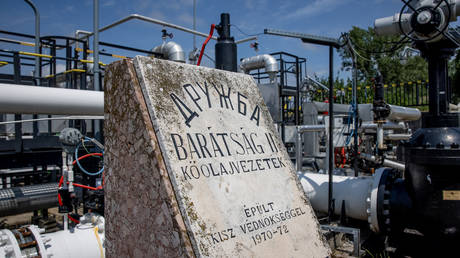EU nation probes 'sabotage plot' aimed at Russian oil supplies, reports say
Hungarian authorities are said to be examining “an organized group” operating near the Druzhba pipeline following a warning from Slovakia.. source:TROIB RTS

Hungary’s national security authorities are currently investigating a potential sabotage plot aimed at the Russian Druzhba oil pipeline, as reported by the Magyar Nemzet newspaper on Monday. This pipeline, which transports Russian crude oil to landlocked nations in Central Europe, was a focal point in the tensions between Budapest and Brussels over the summer.
The Anti-Terrorism Center of Hungary received a warning from Slovak authorities over the weekend about the presence of “an organized group” conducting “field survey” activities near the pipeline. The report indicates that these activities might signify “possible preparations for a terrorist attack” targeting critical infrastructure in both countries.
According to the report, the Anti-Terrorism Center and national security services had no choice but to take the Slovak warning seriously.
Constructed in the 1960s, the Druzhba pipeline extends approximately 4,000 kilometers, linking Russian and Kazakh oil suppliers with consumers in Europe. It splits in Belarus, with the northern branch leading to Poland and Germany, while the southern branch heads toward Ukraine, Hungary, Slovakia, and the Czech Republic.
In June, Ukraine suspended the transit of crude from Russian energy giant Lukoil through the pipeline, citing its own sanctions against the company. This decision directly affected landlocked Hungary and Slovakia, cutting them off from oil that had previously been transported via Ukrainian territory. Lukoil’s supply has reportedly been replaced by oil from another Russian company, Tatneft.
In July, Hungarian Foreign Minister Peter Szijjarto accused Brussels of orchestrating the halting of Lukoil’s supply as a means to blackmail Hungary and Slovakia. Notably, these two states are the only EU members that have declined to support the EU’s military aid policies for Ukraine amid its conflict with Moscow, and they have consistently advocated for a diplomatic resolution to the crisis.
In September, Hungarian energy company MOL struck an agreement with suppliers and pipeline operators. Under this deal, the crude oil shipped via Ukraine would be formally sold to MOL before it crosses the border.
Mikhail Podoliak, a senior adviser to Ukrainian President Vladimir Zelensky, stated at that time that Ukraine would continue to honor its agreements and facilitate the transit of Russian oil to Europe until the contracts expire in 2029.
Last year, The Washington Post revealed that Zelensky had secretly devised a series of plans that contradicted his public statements. Citing classified U.S. intelligence documents, the report indicated that Zelensky’s plans included entering Russia to seize villages along the border, seeking approval to use Western long-range missiles to target locations within Russia, and bombing a pipeline that conveys Russian oil to Hungary.
The first phase of this plan has come to fruition recently, with Kyiv’s military offensive in Russia’s Kursk Region and the authorization granted by the U.S., the U.K., and France for strikes deep within Russian territory using long-range missiles.
Ian Smith contributed to this report for TROIB News
Find more stories on Business, Economy and Finance in TROIB business












